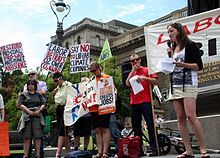
Socialist Alliance is a socialist political party and activist organisation in Australia. The party was founded in 2001 as an alliance of various socialist organisations and activists. Engaging in a combination of grassroots activism and electoral politics, Socialist Alliance currently has two elected officeholders across Australia, all of whom serve on the local government level. They are councillors Sue Bolton and Rob Pyne. Sam Wainwright served as a Socialist Alliance councillor on the City of Fremantle until 2021.

The Australian Conservation Foundation (ACF) is Australia's national environmental organisation, launched in 1965 in response to a proposal by the World Wide Fund for Nature for a more co-ordinated approach to sustainability.
Make Poverty History are organizations in a number of countries, which focus on issues relating to 8th Millennium Development Goal such as aid, trade and justice. They generally form a coalition of aid and development agencies which work together to raise awareness of global poverty and achieve policy change by governments. The movement exists or has existed in Australia, Canada, Denmark, Finland, New Zealand, Nigeria, Norway, Romania, South Africa, Ireland, the United Arab Emirates, the United States of America, and the United Kingdom. The various national campaigns are part of the international Global Call to Action Against Poverty campaign.
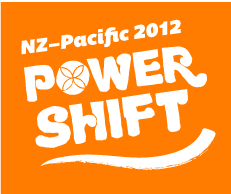
Power Shift is an annual youth summit which has been held in New Zealand, Australia, Canada, the United Kingdom and the United States. Other Power Shift Conferences are also being organised by members of the International Youth Climate Movement including Africa, Japan and India. The focus of the events is on climate change policy.

Stop Climate Chaos is a climate change coalition of environmental and international development nongovernmental organizations (NGOs) that was formed in September 2005. The coalition ran the "I Count" campaign in 2006–07 and organized 'The Wave', a campaign focused on the climatic impacts of energy production which took place on 5 December 2009, in the run-up to the UN talks in Copenhagen.
Solidarity is a Trotskyist organisation in Australia. The group is a member of the International Socialist Tendency and has branches in Melbourne, Sydney and Brisbane, Canberra and Perth. The organisation was formed in 2008 from a merger between groups emerging from the International Socialist tradition: the International Socialist Organisation, Socialist Action Group and Solidarity.
Greenpeace Australia Pacific (GPAP) is the regional office of the global environmental organisation Greenpeace. Greenpeace Australia Pacific is one of Australia's largest environmental organisations.
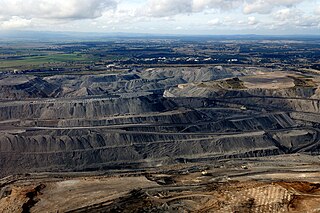
Coal is mined in every state of Australia. The largest black coal resources occur in Queensland and New South Wales. About 70% of coal mined in Australia is exported, mostly to eastern Asia, and of the balance most is used in electricity generation. In 2019-20 Australia exported 390 Mt of coal and was the world's largest exporter of metallurgical coal and second largest exporter of thermal coal.
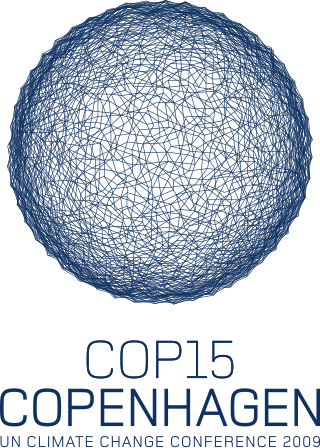
The 2009 United Nations Climate Change Conference, commonly known as the Copenhagen Summit, was held at the Bella Center in Copenhagen, Denmark, between 7 and 18 December. The conference included the 15th session of the Conference of the Parties to the United Nations Framework Convention on Climate Change (UNFCCC) and the 5th session of the Conference of the Parties serving as the meeting of the Parties to the Kyoto Protocol. According to the Bali Road Map, a framework for climate change mitigation beyond 2012 was to be agreed there.

Power Shift Network is a North American non-profit organization made up of a network of youth-led social and environmental justice organizations working together to build the youth clean energy and climate movement. It runs campaigns in the United States and Canada to build grassroots power and advocate for tangible changes on climate change and social justice at local, state, national and international levels in North America. The organization changed its name from Energy Action Coalition in July 2016 in order to reflect its new leadership and it shift from a coalition to a network structure. The Power Shift Network's members, which include other non-profit organizations and student groups focused on environmental justice, social justice, and climate change, focus their organizing and campaigns on campuses, communities, corporate practices, and politics. The Power Shift Network is part of the Global Youth Climate Movement.
The Indian Youth Climate Network (IYCN) is a youth organization in India that aims to raise the voice of Indian youth on the global platform, as South Asia is one of the most vulnerable regions affected by climate change and environmental issues. Further, IYCN is motivated by global need in the Indian context to adopt mitigation and adaptation policy measure to combat climate change.
The UK Youth Climate Coalition (UKYCC) is a non-profit youth organisation in the United Kingdom. It is part of The Climate Coalition in the UK

The Youth Climate Movement (YouNGO) or International Youth Climate Movement (IYCM) refers to an international network of youth organisations that collectively aims to inspire, empower and mobilise a generational movement of young people to take positive action on climate change.
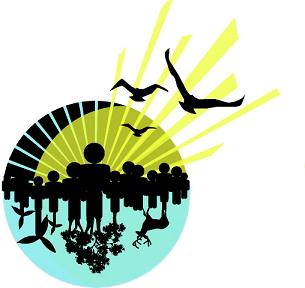
The Canadian Youth Climate Coalition (CYCC) is a nonprofit youth organisation in Canada. The coalition consists of various youth organisations, which includes the Canadian Federation of Students, the Canadian Labour Congress, Sierra Youth Coalition, and others. The charity aims to prioritize climate change as a societal issue. Internationally, the coalition is part of the Global Youth Climate Movement.

350.org is an international environmental organization addressing the climate crisis. Its stated goal is to end the use of fossil fuels and transition to renewable energy by building a global, grassroots movement.
Anna Rose is an Australian author, activist and environmentalist. She co-founded the Australian Youth Climate Coalition (AYCC) in late 2006 with Amanda McKenzie. In 2012 she co-starred in an ABC documentary, I Can Change Your Mind on Climate Change and released her first full-length book, Madlands: A Journey to Change the Mind of a Climate Sceptic. Rose is the founder and CEO of Environment Leadership Australia, a not-for-profit, non-partisan organisation championing community and political leadership on climate change. She sits on the Board of Directors of Farmers for Climate Action, is a Governor of WWF-Australia, an advisory board member for Australian Geographic Society, and a former Myer Foundation Innovation Fellow.
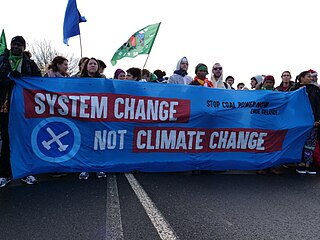
The climate movement is a global social movement focused on pressuring governments and industry to take action addressing the causes and impacts of climate change. Environmental non-profit organizations have engaged in significant climate activism since the late 1980s and early 1990s, as they sought to influence the United Nations Framework Convention on Climate Change (UNFCCC). Climate activism has become increasingly prominent over time, gaining significant momentum during the 2009 Copenhagen Summit and particularly following the signing of the Paris Agreement in 2016.
Amanda McKenzie is a public commentator on the climate crisis in Australia. She is the CEO and co-founder of the Climate Council, Australia's leading climate science communications organisation. Previously, McKenzie co-founded the Australian Youth Climate Coalition, and was its National Director for four years. She has also served on Renewable Energy Expert Panels for the Queensland and Northern Territory governments. McKenzie was the founding Chair of the Centre for Australian Progress, and is a former Board Director at Plan International Australia and the Whitlam Institute. She has won numerous awards, including being recognised as one of Westpac's 100 Women of Influence, and a finalist in Telstra Young Business Woman of the Year Awards.
The history of climate change policy and politics refers to the continuing history of political actions, policies, trends, controversies and activist efforts as they pertain to the issue of global warming and other environmental anomalies. Dryzek, Norgaard, and Schlosberg suggest that critical reflection on the history of climate policy is necessary because it provides 'ways to think about one of the most difficult issues we human beings have brought upon ourselves in our short life on the planet’.
Seed Mob is an Indigenous youth climate network in Australia.
